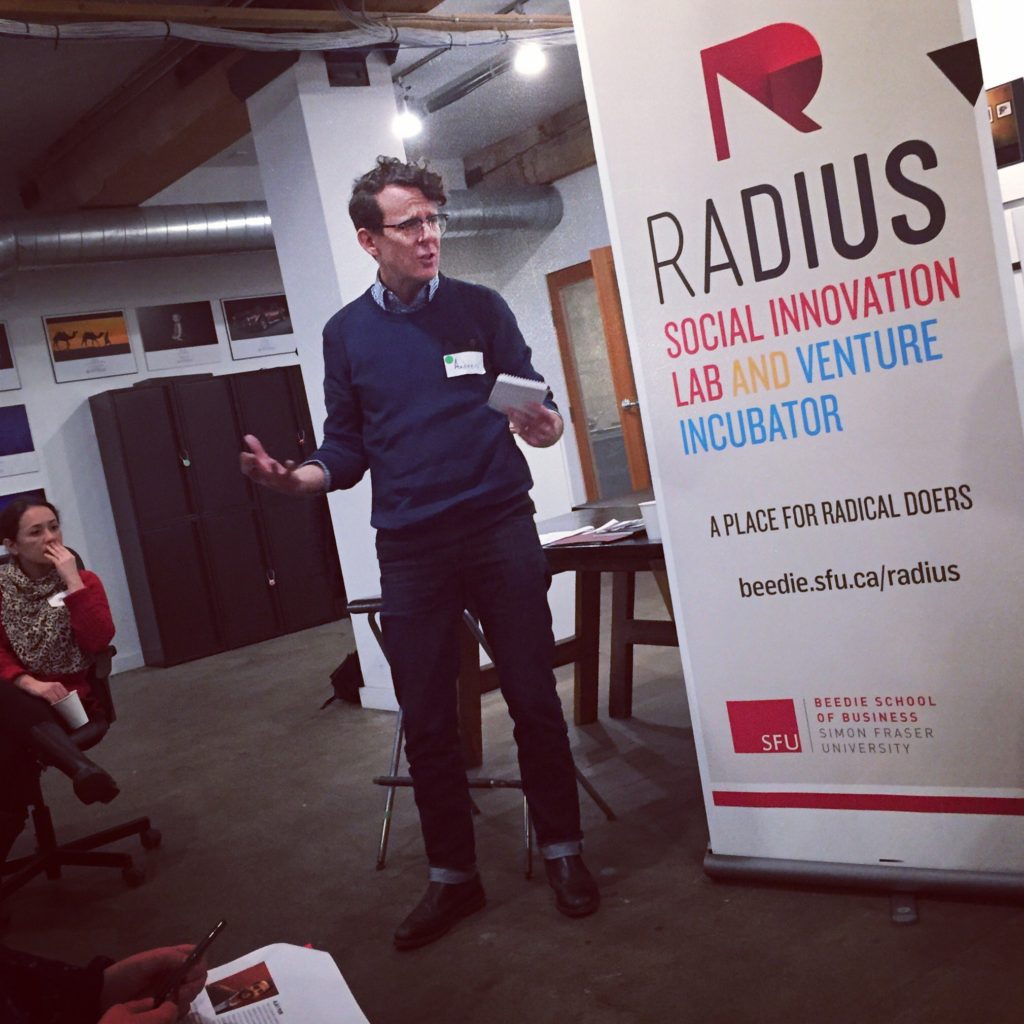Freelance Skillshare and Community Building Opportunities
by Amanda Maxwell

Urban Worker Project co-founder Andrew Cash speaks at the Vancouver Skillshare event. Photo by Don Genova
Considering the freelance route, jumping from the nine-to-five into the freedom of midnight keyboard sessions in your PJs? Terrified but excited, and not sure where to go for information?
While there are a lot of resources out there, they’re mostly online with very little of the personal touch.
If you don’t know many freelancers, events such as the recent Urban Worker Project Skillshare workshop in Vancouver at Creative Coworkers co-working space in Railtown can give you a taste of what freelancing is really like.
In addition to sessions on taxation, financing and software tools, attendees also learned about insurance options for self-employed workers and the networking potential in co-working spaces for collaborative projects. Small group roundtable sessions with industry experts ensured that everybody had a voice. This was definitely the place to ask those burning questions.
How do I choose project management, financial and CRM (customer relationship management) tools for a freelance life?
At the start, it’s easy to rush headlong into a disorganized mess. Rachel Flood from Alignment Ops recommends using tools that streamline data management into a one-time entry that propagates through different cloud-based tools. You can save time on project management, time tracking, invoicing and client wrangling by choosing platforms that talk to each other.
For example, a platform like Insightly stores contact details, integrates with time tracking and satisfies invoicing requirements from one data entry.
But how to choose? Rachel suggests examining your existing workflow to see what you need to get your work done. Once identified, list these and some bonus features in a spreadsheet for clear visual scoring between available platforms. Extra bonus points for colour coding!
Hint: A platform’s help section indicates timely customer service; tools still in version 1.0 could be buggy.
Tips for streamlining the workflow:
- Check out the free versions or trials to test drive platforms before committing.
- Look for APIs (application program interface) for easy integration with other products.
- Store data for accessibility—look at cloud solutions rather than your deskbound desktop.
- Automate routine tasks where possible, using tools like Zapier or my personal favourite, IFTTT.
Rachel suggests:
- Project management – MavenLink and Harvest
- CRMs – HubSpot and Insightly, with a plug for One-Page CRM from another freelancer
- ‘Robots’ – Zapier (and IFTTT)
Rachel’s final tip – “leverage what you already do rather than changing everything at once.”
What should I claim for my home office?
Taxation. Every freelancer wants to know about taxation—what to pay, what to claim, how to report. In addition to office supplies and professional subscription fees, did you know that your working space is also a legitimate claim?
According to Jessica Somers, a chartered professional accountant, self-employed workers can claim for their home office within form 2125 of a Canadian tax return.
- Calculate the square footage of your dedicated office.
- Work out its proportion in your total living space.
- Apply this figure to determine how much of your utilities, mortgage interest, rent, strata fees, home insurance and property taxes to claim as a business expense.
Note: To qualify, you must be using your home office space for 50% or more of your working hours; beware co-working hours or on-site work for a client. Keep records!
Hint: Home office space should not be significant; Jessica suggests keeping your claim to less than 15% of your total livable space—more than that may be considered unreasonable.
Final Tip: Don’t claim for depreciation on your home as you may lose capital gains protection from the principal residence exemption when you sell.
Where can I get financing/support/mentorship to start my new business?
Maybe you want to turn your side hustle into something more. Humaira Hamid from Futurpreneur Canada has some useful resources if you’re dreaming big but don’t know how to get started.
Organizations such as Futurpreneur are valuable one-stop shops for small business financial and planning advice. In addition to supporting young startups with loans, Futurpreneur will also link you up with a mentor.
Humaira’s tip: mentors “help you to know what you don’t know.”
The Personal Touch
For newbies, workshops like the Skillshare are valuable resources. Filled with personal anecdotes and pointers on life without punching in, they give the true grit of lived experience.
For experienced freelancers, events that bring self-employed and other precarious workers together are also great opportunities for networking and sharing strategies. They’re also great for building community, an essential experience if you rarely step outside your (reasonably sized) home office.
You never know – you might just meet up with your next collaborative project.
Amanda Maxwell describes herself as a freelance science writer and digital space explorer. Her comfort zone is clinical research; her background is veterinary; she goes fangirl over protein chemistry. Despite these quirks, Amanda also enjoys writing business reviews, managing an arts centre website, and creating corporate blog posts out of primary research papers. Make contact on Twitter @afmaxwell.
CMG Freelance is partnering with the Urban Worker Project on a similar Skillshare workshop in Toronto on April 29. We’ll have a few tickets to give away, keep your eye on Story Board over the next few days for details.



